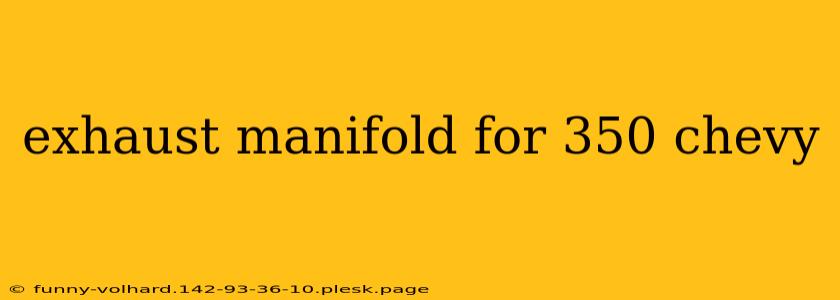Choosing the right exhaust manifold for your 350 Chevy engine is crucial for performance, sound, and longevity. This guide dives deep into the options available, helping you make an informed decision based on your specific needs and preferences.
Understanding Your 350 Chevy's Exhaust Needs
Before diving into the specifics of different manifolds, it's important to understand what factors influence your choice. Consider these key aspects:
- Year and Model: The year of your 350 Chevy significantly impacts the available manifold options. Early models may require specific designs, while later models offer more choices.
- Engine Modifications: Have you modified your 350 Chevy? Modifications like higher compression ratios, camshaft upgrades, or forced induction (turbocharging or supercharging) will drastically influence your manifold needs. High-performance modifications often require manifolds designed for increased flow.
- Intended Use: Are you building a street-driven cruiser, a dedicated race car, or something in between? This dictates the balance you'll need between performance, sound, and practicality. Street applications often prioritize a quieter, more refined exhaust note, while race cars prioritize maximum power.
- Budget: Exhaust manifolds range dramatically in price. Consider your budget alongside the performance benefits offered by each type.
Types of 350 Chevy Exhaust Manifolds
Several types of exhaust manifolds cater to different needs and performance goals:
1. Cast Iron Manifolds
- Pros: Affordable, durable, and readily available. Excellent for stock or mildly modified engines. They offer good heat retention, aiding in faster warm-up.
- Cons: Heavier than other options, and they typically restrict exhaust flow more, leading to lower performance potential compared to headers. They can also be prone to cracking under high stress.
2. Tubular Headers
- Pros: Significantly improve exhaust flow, leading to noticeable horsepower and torque gains, especially in modified engines. They offer a sportier exhaust note. Lighter than cast iron.
- Cons: More expensive than cast iron manifolds. They can be more challenging to install, often requiring modifications to the vehicle's undercarriage. They can also generate more heat in the engine bay. They are not always street-legal, depending on local regulations.
3. Header Material: Steel vs. Stainless Steel
Both steel and stainless steel are common materials for headers. Stainless steel offers superior corrosion resistance, making it ideal for long-term use and harsh climates. However, stainless steel headers are typically more expensive. Steel headers are a more budget-friendly option but require more maintenance to prevent rust.
Choosing the Right Manifold for Your Needs
The best exhaust manifold for your 350 Chevy depends on your specific requirements. Here's a breakdown to help you decide:
- Stock or Mildly Modified Engine: A cast iron manifold is a cost-effective and reliable choice.
- Moderately Modified Engine: Consider a set of shorty headers for improved performance without the extreme installation challenges of longer headers.
- High-Performance or Race Engine: Long-tube headers are the clear choice for maximizing power and flow.
Remember to always consult your vehicle's specifications and local regulations before purchasing and installing any exhaust components.
Installation Considerations
Installing an exhaust manifold, especially headers, can be complex and often requires specialized tools. If you lack experience, it's recommended to seek professional installation to avoid potential damage to your engine or vehicle.
This guide provides a solid foundation for choosing the right exhaust manifold for your 350 Chevy. Remember to carefully consider your engine modifications, budget, and intended use to make the best decision for your specific project.

